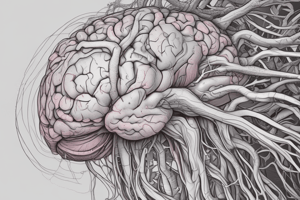Podcast
Questions and Answers
The human brain contains billions of specialized cells called ______
The human brain contains billions of specialized cells called ______
neurons
The brain's outer surface is covered by the cerebral cortex responsible for higher cognitive functions like reasoning, problem-solving, perception, and ______ processing
The brain's outer surface is covered by the cerebral cortex responsible for higher cognitive functions like reasoning, problem-solving, perception, and ______ processing
language
The brain's hemispheres, right and left, are specialized for different tasks; the left hemisphere is dominant in most right-handed people for ______ processing
The brain's hemispheres, right and left, are specialized for different tasks; the left hemisphere is dominant in most right-handed people for ______ processing
language
The cerebral cortex is often referred to simply as the ______
The cerebral cortex is often referred to simply as the ______
Functional magnetic resonance imaging (fMRI) allows us to visualize brain activity during specific tasks, revealing which parts of the ______ are engaged in various activities.
Functional magnetic resonance imaging (fMRI) allows us to visualize brain activity during specific tasks, revealing which parts of the ______ are engaged in various activities.
Brain-computer interfaces (BCIs) explore direct communication between the brain and technology, using neuronal signals to control devices and assist individuals with ______ disabilities.
Brain-computer interfaces (BCIs) explore direct communication between the brain and technology, using neuronal signals to control devices and assist individuals with ______ disabilities.
Neuroplasticity refers to the brain's ability to adapt and reorganize itself throughout an individual's ______.
Neuroplasticity refers to the brain's ability to adapt and reorganize itself throughout an individual's ______.
The brain's complex connectivity and vast neural networks make deciphering its intricacies a daunting ______.
The brain's complex connectivity and vast neural networks make deciphering its intricacies a daunting ______.
The human brain is a fascinating organ that continues to captivate scientists and ______ alike.
The human brain is a fascinating organ that continues to captivate scientists and ______ alike.
As we delve deeper into the mysteries of the brain, we stand poised at the precipice of exciting new ______ that will undoubtedly shape our understanding of ourselves and the world around us.
As we delve deeper into the mysteries of the brain, we stand poised at the precipice of exciting new ______ that will undoubtedly shape our understanding of ourselves and the world around us.
Flashcards are hidden until you start studying
Study Notes
Discovering the Puzzle within the Human Brain
The human brain is a complex, interconnected organ that defines who we are and governs our thoughts, emotions, and actions. To delve into this intricate marvel, we'll explore the structure, functions, and intriguing developments in our understanding of the brain, focusing on the remarkable organ that is our brain's command center: the cerebral cortex, often referred to simply as the brain.
Structure
The human brain weighs about 3 pounds and contains billions of specialized cells, called neurons, that communicate through electrical and chemical signals. The brain is divided into several regions, each with its own function, but the cerebral cortex is the most complex and best-understood part. It's composed of gray matter, which consists of neurons and their connections, and white matter, which consists primarily of axons—the long, thin projections of neurons that transmit electrical signals.
Functions
The cerebral cortex, spread across the brain's outer surface, is responsible for higher cognitive functions, including reasoning, problem-solving, perception, and language processing. Its convoluted folds, called gyri, provide a larger surface area for this complex work.
The brain's hemispheres, right and left, are specialized for different tasks. The left hemisphere is dominant in most right-handed people for language processing, while the right hemisphere is more involved in spatial awareness, creativity, and emotional processing.
Advances and Discoveries
Recent developments in neuroscience and technology have allowed us to explore the brain in new ways. For instance, functional magnetic resonance imaging (fMRI) allows us to visualize brain activity during specific tasks, revealing which parts of the brain are engaged in various activities.
Brain-computer interfaces (BCIs) are another exciting field of research that explores direct communication between the brain and technology. BCIs use neuronal signals to control devices and assist individuals with motor disabilities.
Neuroplasticity
A particularly intriguing concept is neuroplasticity, which refers to the brain's ability to adapt and reorganize itself throughout an individual's life. This capability allows the brain to compensate for injury and disease and to adjust its activities in response to new situations and to learning.
Challenges and Limitations
Despite the wealth of knowledge we've gained about the brain, many mysteries remain unsolved. For example, the specific mechanisms underlying consciousness are still not fully understood. The brain's complex connectivity and vast neural networks make deciphering its intricacies a daunting task.
Conclusion
The human brain is a fascinating organ that continues to captivate scientists and laypeople alike. The understanding of its structure and functions has greatly advanced, but much remains to be discovered. As we delve deeper into the mysteries of the brain, we stand poised at the precipice of exciting new discoveries that will undoubtedly shape our understanding of ourselves and the world around us.
Studying That Suits You
Use AI to generate personalized quizzes and flashcards to suit your learning preferences.



